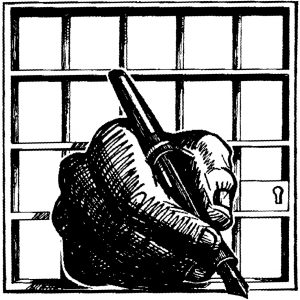From the November-December 2018 issue of News & Letters
by Faruq
The phrase “Next Chapter” is one we often hear someone say as an indication of the closing of a particular phase of their life and the beginning of a different phase. It speaks to the process i’m currently going through. It is a process that has brought forth a host of emotions: apprehension, anxiousness, and joy. I have been working to keep these emotions in check as much as i can, which has not been easy. It is important for me to stay as level-headed as possible. That is because moving into the next phase of my life is not yet fully accomplished.
NOT ABOUT ONE PRISONER
 This process is one that i’m experiencing as an individual and, at the same time, it is not just about me. It is about representing a specific class of prisoners, one that held out no realistic chance of ever being in the position that i’m in today. When i make the claim of “no realistic chance,” it is not an attempt to sound hyperbolic. To the contrary, it is a clear statement of fact.
This process is one that i’m experiencing as an individual and, at the same time, it is not just about me. It is about representing a specific class of prisoners, one that held out no realistic chance of ever being in the position that i’m in today. When i make the claim of “no realistic chance,” it is not an attempt to sound hyperbolic. To the contrary, it is a clear statement of fact.
Up until the 2013 Pelican Bay Hunger Strike, prisoners classified as so-called gang members or associates had no realistic chance of ever exiting the sterile environment of the Security Housing Units (SHU). The unprecedented prison hunger strike in California and its success has ushered in a new dynamic for SHU policy from which i’m benefiting.
As I move forward to the next phase of my life, i feel indebted to the intrepid men whose sacrifice—59 days without eating—forced the California Department of Corrections and rehabilitation to alter the length of time prisoners could be confined in the SHU. For all the prisoners who were permanently entombed in the SHUs and thereby erroneously termed “the worst of the worst,” there is an obligation on their part—on our part—and even more on society’s part, to demonstrate the character that refutes such a ridiculous designation.
THE PROCESS OF NEGATION
The motivation to refute the erroneous designation, “the worst of the worst,” didn’t take place overnight. The refutation grew due to the intensification of the dehumanization of us prisoners, specifically the creation of the short-corridor—the methodology of maximum isolation entailing a host of draconian regulations meant to reinforce its existence in the minds of us prisoners.
Subjecting us to the coercive nature of the short-corridor, designed to totally dehumanize us and thereby to make us feel helpless, created the need for us to reclaim our humanity.
That can be seen in the creation of the “Agreement to End Hostilities” and the resulting social practice. The “Agreement” itself is, in no uncertain terms, a reach by prisoners for a different level of social interaction; nothing less than a true display of humanism that does not dismiss racial differences and is capable of embracing them as a necessity to move to a more humanistic society of tomorrow.
A DIFFERENT DAY
The change in the SHU policy has wrought a new day for us prisoners. The change is major because it actually turns the once improbable thought of gaining a grant of parole into the probable.
The different day for me arrived when i was found suitable for parole. It cast a new light on my life. I certainly will leave prison a totally different person than when I entered in 1972. The journey has been an experience that has greatly helped shape the person that I am today. I’m ready to meet the challenges that will come my way.

Congratulations on withstanding all the things that were meant to break you. I wish you well in your upcoming future, may you find peace, joy, love and understanding.